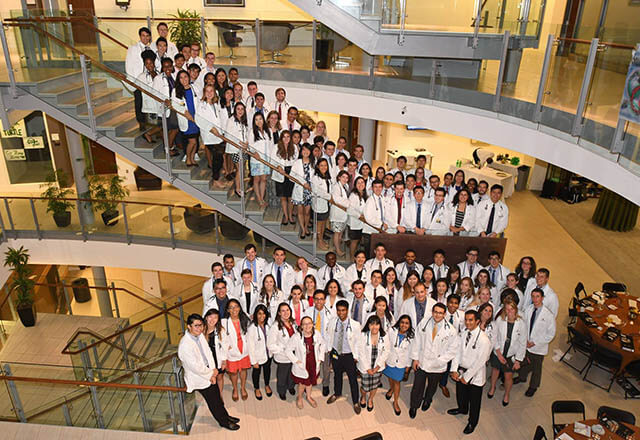-
Christopher Oakley, MD

- Co-director, Johns Hopkins Headache Center
- Associate Professor of Clinical Neurology
-
Rachel Salas, MD MED

- Assistant Medical Director, Johns Hopkins Center for Sleep and Wellness
- Professor of Neurology
Core Clerkship in Neurology
The Overall Goal of the Neurology Core Clerkship is to teach the principles and skills necessary to recognize and manage the neurologic diseases a general medical practitioner is most likely to encounter in practice. This clerkship introduces students to the discipline of neurology by providing a broad exposure to the fundamental elements related to delivering clinical care to a neurological patient and the fundamental concepts associated with ethics, research and education in neurosciences. Students rotate through inpatient and outpatient clinical sites. Instruction occurs through direct patient contact, bedside teaching, simulation and physical examination teaching associates and student conferences.
PRECEDE Overview
The objective of NeuroPRECEDE (Pre-Clerkship Education Exercises) is to prepare medical students for their clinical neurology experience by highlighting essential elements of the discipline. Emphasis is placed on developing and sharpening the skills required when performing a neurological exam as well as introducing fundamental knowledge and principles valuable in any clinical setting no matter the specialty. Through small-group sessions, interactive/hands-on practicums and engaging lectures by top faculty in the department, students are taught skills designed to enhance the Neurology Clinical Clerkship experience.
Core competencies are addressed via interactive hands-on and simulated sessions such as:
- The Lumbar Puncture Workshop
- Neuro “Bootcamp” lecture series, comprised of The Abnormal Neuro Exam, Examining the Pediatric Neurology patient, and Movement Disorders
- Clinical Reasoning in Neurology interactive online curriculum
Learning Objectives
1. To teach and reinforce proficiency in the following procedural skills:
- Interview to obtain a complete and reliable neurologic history (Clinical reasoning curriculum)
- Perform a reliable neurologic examination (i.e., NeuroEx)
- Examine patients with altered level of consciousness (CRN)
- Deliver a clear, concise, and thorough oral presentation of a patient’s neurologic history and examination (Clinical reasoning curriculum)
- Prepare a clear, concise, and thorough documentation of a patient’s neurologic history and examination (Clinical reasoning curriculum)
- Communicate empathetically with patients and families (Communication card)
- Perform a lumbar puncture under direct supervision, or using simulation (LP workshop)
- Be aware of billing and cost utilization in neurology in an effort for providing high value care (Clinical reasoning, Dementia and Caregiving)
- Work interprofessionally with other healthcare professionals to provide value care (IPCP activity, NeuroPharm flipped classroom, PT/OT/SLP module; Dementia and Caregiving)
2. To teach and reinforce proficiency in the following analytical skills:
- Recognizing symptoms that may signify neurologic disease (including disturbances of consciousness, cognition, language, vision, hearing, equilibrium, motor function, somatic sensation, and autonomic function) (Clinical reasoning curriculum)
- Identifying symptoms that may represent neurologic emergencies (Clinical reasoning curriculum; Neuro Emergencies modules)
- Distinguishing normal from abnormal findings on a neurologic examination (Abnormal Examination Precede; Neuro Ex; Clinical reasoning curriculum)
- Localizing the likely sites in the nervous system where a lesion may produce a patient’s symptoms and signs (Clinical reasoning curriculum)
- Formulating a differential diagnosis based on lesion localization, time course, and relevant historical and epidemiologic features (Clinical reasoning curriculum)
- Explaining the indication, potential complications, and interpretation of common tests used in diagnosing neurologic disease (Clinical reasoning curriculum)
- Demonstrating awareness of the principles underlying a systematic approach to the management of common neurologic diseases (Clinical reasoning curriculum; Precede, Video module; NeuroEbook)
- Describing timely management of neurologic emergencies (Neuro Emergencies modules)
- Developing, presenting, and documenting a succinct, appropriate assessment and plan for the neurologic problem list (Clinical reasoning curriculum)
- Recognizing situations in which it is appropriate to request neurologic consultation (Inpatient clinical services)
- Reviewing, interpreting, and applying pertinent medical literature to patient care (Inpatient clinical services)
- Understanding cognitive biases and their implications for diagnostic errors (Inpatient clinical services; clinical reasoning curriculum; Communication card tool; Health Disparities in neurology video)
- Developing skills needed to deliver patient-centered, compassionate neurologic care with emphasis on diversity, inclusiveness, and recognition of implicit bias (Communication card, IPCP activity, Dementia and Caregiving)
- Applying principles of medical ethics to patient care (Communication card; Peer Ethics Corner)
- Identifying socioeconomic and regulatory issues and other health disparities that may influence accessibility of affordable diagnostic and therapeutic resources (Communication card, IPCP activity, Dementia and Caregiving)
- Explaining the public health impact of neurologic disorders (Inpatient clinical services)
- Become familiar with medications used to treat neurological disorders (indication/methods of action/side effect profiles/interactions), (Neuro Pharmacology flipped classroom)
Clerkship Directors
Contact
Bernadette Clark
Medical Training Program Administrator
Email: mclark44@jhmi.edu
Time Commitment and Clerkship Length
This clerkship runs for four weeks and is always paired with the core clerkship in Psychiatry to complete an eight-week core.
Clinical Sites for this Clerkship
- Johns Hopkins Hospital (adult and pediatric inpatient & consult services, outpatient specialty clinic) - View map
- Johns Hopkins Bayview Medical Center (adult inpatient & consult services, outpatient specialty clinic) - View map
- Sinai Hospital – LifeBridge Health Brain & Spring Institute - http://www.lifebridgehealth.org/BrainSpine/PJayForemanMDPhD.aspx
- Anne Arundel Medical Center - View map
- Johns Hopkins Howard County Medical Center - View map (PDF)
More on Neurology
Learn more about the education programs in neurology.



